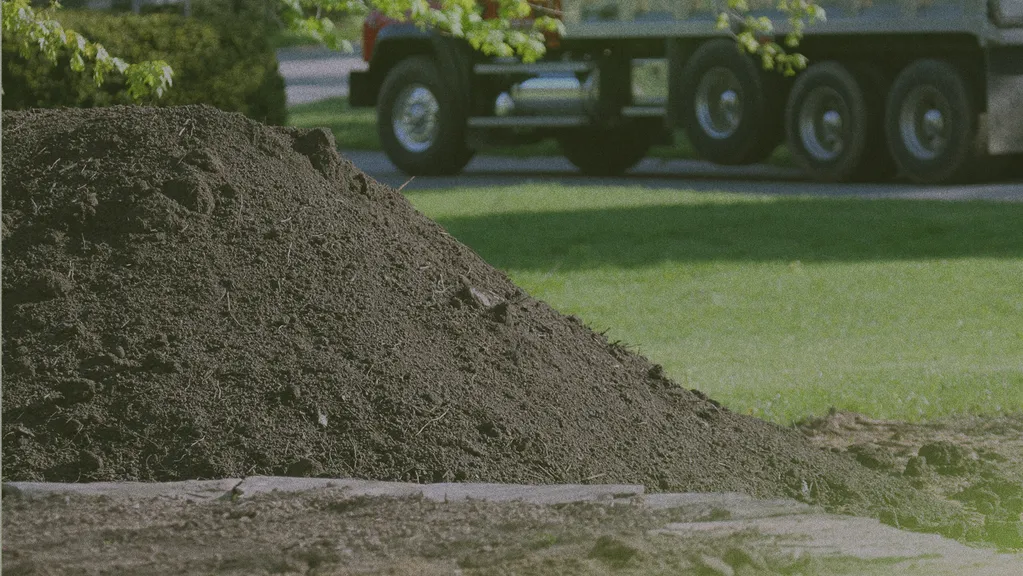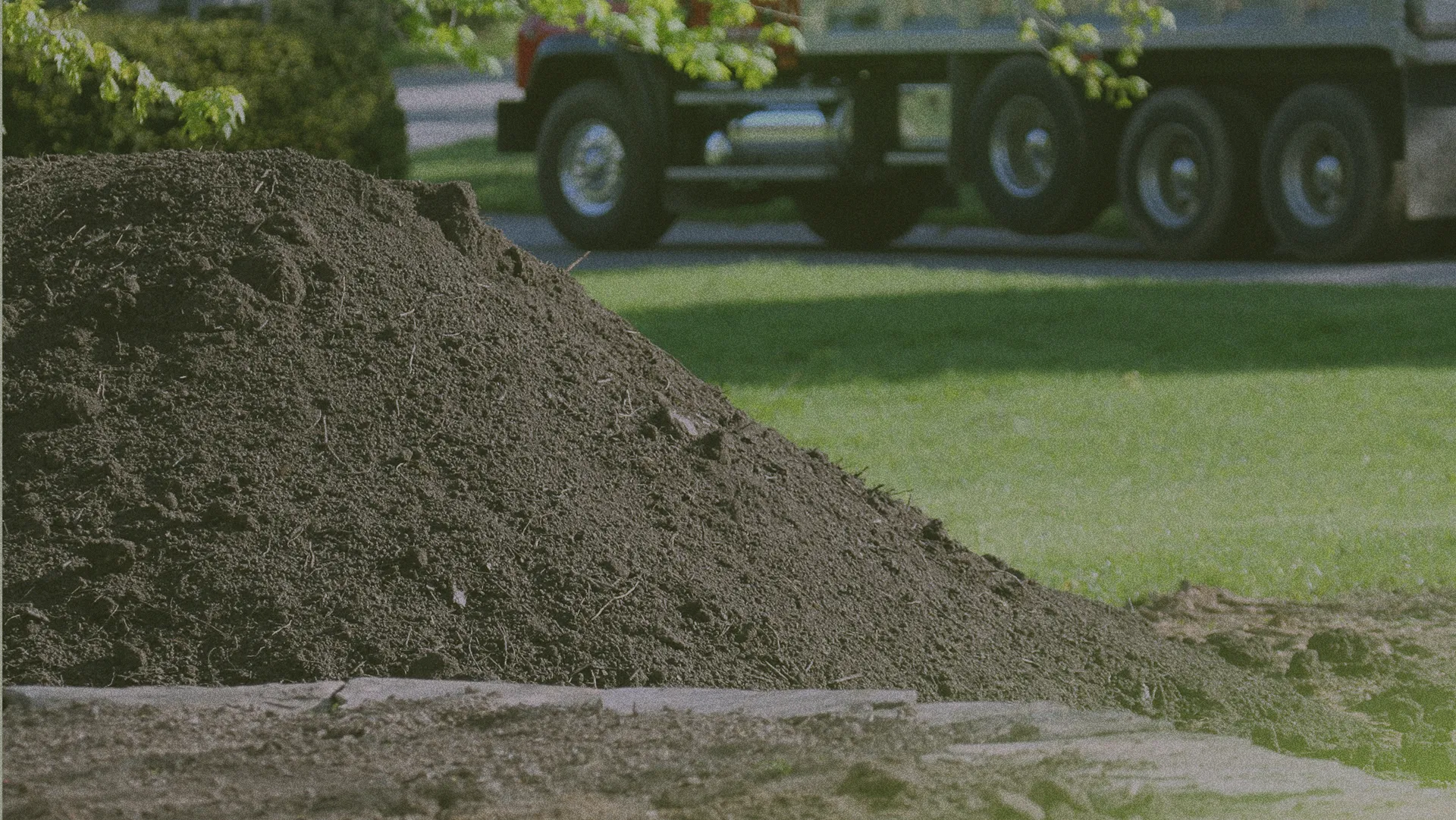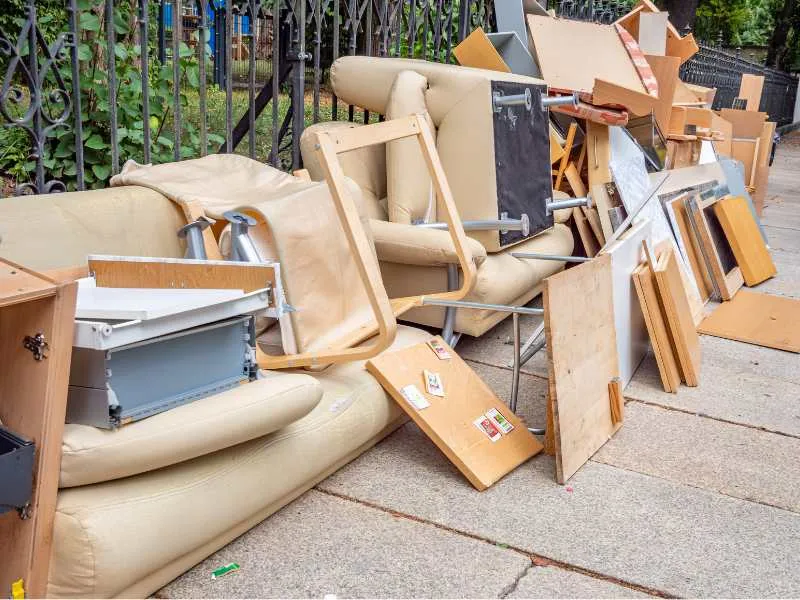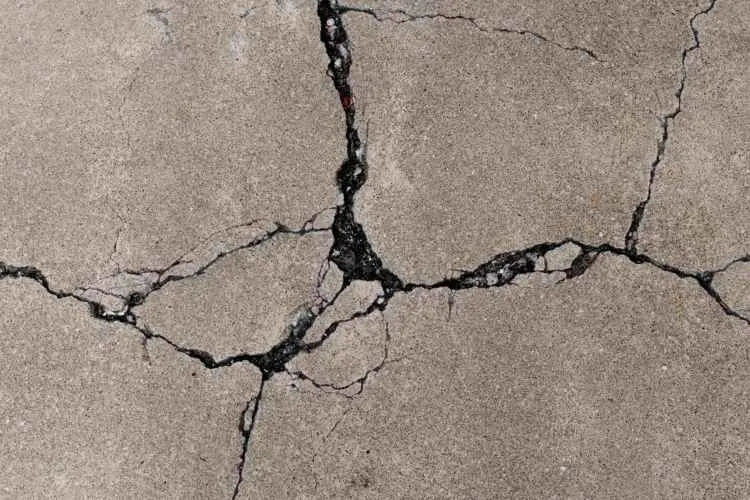Yard renovations, pool installations, and construction projects are just some of the undertakings that can leave you with excess fill dirt or topsoil.
If you’re wondering how to dispose of dirt properly (and easily), keep reading to learn about dirt disposal options and regulations around dirt disposal.
Can You Throw Dirt in the Trash?
Dirt is classified as construction and demolition (C&D) waste, which means it must be taken to an approved facility, and not tossed in a garbage bin or set out for curbside pickup.
Whether or not your dirt can be reused, recycled, or landfilled depends on its condition.
Uncontaminated dirt (also called clean fill) is usually accepted at landfills, recycling centers, or clean fill sites. It should be:
Free of debris, trash, and construction materials
Not exposed to chemicals, paint, or treated wood
Dry, loose, and natural in appearance
Contaminated dirt, on the other hand, typically requires special handling and can come from demolition sites, industrial areas, or places where soil has been mixed with insulation, concrete, plastic, fuel, pesticides, or treated wood.
Contaminated soil typically cannot be reused or recycled without testing, and many facilities won’t accept it at all. If you're unsure about the source or condition of your dirt, contact a local landfill or recycling center before trying to dispose of it.
5 Best Ways to Get Rid of Dirt
Clean, contaminate-free dirt can be recycled, reused, and disposed of in many different ways, including:
1. Dumpster Rental
If you have a large amount of dirt to get rid of, renting a dumpster is the most efficient way to do it.
Sourgum has roll-off dumpsters in multiple sizes, but for dirt, the best options are 10-yard, 15-yard, or in some cases 20-yard containers. A 10-yard holds about four pickup truck loads, while a 15-yard fits around six. We deliver the dumpster to your location, you load it, and we haul it away to a local facility that recycles clean fill whenever possible. No hidden fees, no need to be home for delivery, and no hassle. All our pricing is upfront and includes delivery, pickup, and disposal within a set weight allowance.
Contact us and get a fast, reliable dirt dumpster delivered to your location.
| Benefits | Things to Consider |
| Receive your all-inclusive rate before the rental even arrives | Must load dirt into dumpster yourself |
| Reliable, scheduled disposal of dirt | Best for larger amounts of dirt, like from construction or landscaping projects |
| No need to be home for pickup | Most dirt dumpsters can only be filled with dirt or sometimes dirt and C&D materials |
2. Dirt Recycling
Several places accept dirt for recycling, such as landfills and landscaping facilities. Just keep in mind, it’s a good idea to call ahead and confirm whether they’re currently accepting dirt waste, as policies can vary depending on location and capacity.
You can also look into landscaping suppliers and construction and demolition recycling facilities in your area. If you only have a small amount of soil, you can bag it up and haul it to one of these facilities yourself.
These facilities accept dirt for recycling::
Landfills and transfer stations
Construction and demolition recycling centers
Landscaping supply companies
| Benefits | Things to Consider |
| Eco-friendly option for dirt disposal | You have to find a location that accepts dirt waste yourself, may take some research |
| Affordable way to get rid of dirt | You have to bring the dirt to the recycling location yourself |
| Can help someone in need of soil or dirt | Works best for a small to moderate amount of soil |
3. Reusing Dirt
If your soil is clean and dry, reusing it is one of the most sustainable (and budget-friendly) ways to handle excess dirt. You’re essentially upcycling a natural material that would otherwise go to waste and putting it to good use around your property.
Store the dirt in sealed, waterproof containers and keep them out of direct sunlight to maintain its quality. Once stored properly, the dirt can be used for a variety of outdoor projects like:
Creating a raised garden bed
Redoing an existing flower bed
Building a fire pit
Filling in low spots in the yard
Creating a berm
| Benefits | Things to Consider |
| Most sustainable dirt "disposal" option | Some soil cannot be reused, such as contaminated dirt or dirt mixed with inorganic materials |
| Can help you save money on yardwork and landscaping projects | Need to have some use for all the soil or dirt you have |
4. Donating Extra Dirt
Since quality soil is always in demand, there’s a good chance someone nearby needs exactly what you’re trying to get rid of.
Before donating, make sure the dirt isn’t mixed with gravel, roots, or debris. The cleaner it is and the easier it is to transport, the more likely someone will be willing to take it.
Try to store it in an accessible spot, like near a driveway or curb, and if you can, separate it into smaller piles or bag it up to make pickup easier.
Some places may charge a small fee to take it, especially if they screen or resell soil, but in most cases, people are willing to haul it off if it saves them the cost of buying new.
These are just some of the places that accept dirt donations:
Nurseries and gardening centers
Landscaping companies
Construction companies
Local farms
| Benefits | Things to Consider |
| A sustainable way of dirt disposal | Might be charged a small fee for dropping the dirt donation |
| Helps people in need of dirt, such as community centers and schools | Can be difficult to find a garden center or other location that accepts dirt donations |
| Dirt typically needs to be of quality and clean to be accepted |
5. Hire a Junk Removal Company
Junk removal companies may offer dirt removal services as well. The cost of their services depends on how much dirt you have, as they either charge by weight, or by how much of their truck is used (1/8th of a truckload, 1/4th of a truckload, etc).
The typical weight limit for junk removal services is 4,000 lbs, so they’re best suited for light dirt loads that don’t require a full dumpster.
| Benefits | Things to Consider |
| No heavy lifting for you | Rates are subject to increase upon arrival of removal specialists |
| Offers a scheduled disposal of dirt | Must be present for the pickup |
| Best for moderate-medium amounts of dirt | |
| Prices can quickly increase depending on the amount/weight of your dirt |
FAQs About Dirt Disposal
Can you throw soil in the garbage?
No, you cannot. Curbside garbage collection does not include dirt or soil, and doing so can result in missed pickups or fines.
How to get rid of dirt?
You can safely dump dirt at several approved locations:
A landfill or transfer station that accepts clean fill
Construction and demolition (C&D) recycling centers
Dirt recycling or clean fill sites
Landscaping supply yards or garden centers (some may accept high-quality topsoil)
Can you put dirt in a dumpster?
You can put dirt in a dumpster if it's clean and the dumpster rental allows for soil disposal. If you're unsure whether your material qualifies, or you're disposing of other items too, check out our full guide on what you can and can’t throw in a dumpster for a detailed breakdown.
Can I get rid of soil that is mixed with other materials?
If your soil is mixed with natural debris like leaves, grass, or small rocks, it’s usually still acceptable for disposal. But if it contains prohibited items like treated wood, trash, chemicals, or concrete chunks, you’ll need to separate it or dispose of it as contaminated fill.





